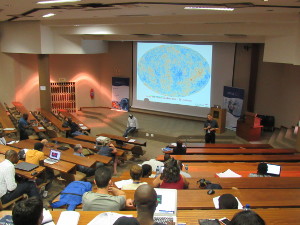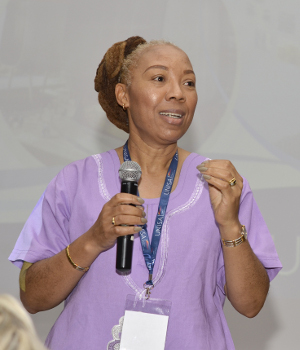News & Events
Summer School opens minds and explores new directions

Professor Larry Gladney, answering questions from the audience after his presentation on “From quarks to cosmos and back again".
"Listen, absorb, participate, contribute, go from here inspired with new ideas and a broader sense of different academic disciplines,” was the call made to master’s and doctoral students by Professor Michelle Havenga, Executive Dean: College of Graduate Studies, during her opening address at the 5th Interdisciplinary Postgraduate Summer School.
This annual event, held at the Science Campus in November this year, focused on interdisciplinary research, without losing the disciplinary aspect. For this reason, there were six streams addressing scientific, socio-economic and political issues during general plenary lectures, and six breakaway sessions.
The six streams were:
- Men in ex-colonies
- Social protest and violence
- Drosophila as a model organism in drug discovery and development
- The intersection of cosmology and particle physics
- New and emerging water treatment technologies
- Sustainable energy
From male dominance and violence to the fruit fly
Professor Jeff Hearn of Orebro University in Sweden explored the question, “Why study men and masculinities, here and elsewhere, now and in the future?
He spoke about how for the longest of time men were referred to just as human beings but in recent years there has been an increasing interest in “naming men as men”. The resulting critical analysis of men’s lives in business, politics and academia has portrayed men as still dominating in these spheres and in society overall. Looking into the future, gender transformation (changing social or gendered power relations) will allow a space for more women to be in places of power.
"Most violence is not created by crazy people!” said Professor Alan Fiske of the University of California, who used this opening statement to address the topic, “The moral motive for most violence: Making relationships ‘right’”. He discovered in his research that violence is in fact an action “morally” motivated by majority. This is the case in all cultures across history, he said, adding that morally motivated violence does not necessarily mean that people enjoy the violence or initiate it easily.
Martial and contact sports, war, human sacrifice, body scarification and modification, police and domestic violence are actions morally motivated by majority.
Professor Jean-Marc Reichhart of the IUS-UdS in France spoke about how the fruit fly, Drosophila, has facilitated many scientific discoveries. “The fruit fly is one of the most versatile model organisms for use in many disciplines especially in genetics and in biochemistry. One of the key benefits of flies as model organisms is their genetic similarity with humans. Thus, many biochemical pathways are conserved in the fruit fly, making them very useful organism to study clinical matters.”

Dr Daisy Selematsela, acting Vice-Principal: Research Postgraduate Studies, Innovation and Commercialisation addressing the postgraduate students
A universe of knowledge
The universe is complex and full of wonders, Professor Larry Gladney from the University of Pennsylvania said in his presentation, “From quarks to cosmos and back again”. He spoke about how the era of big data astronomy has brought about revolutionary changes in the understanding of cosmology. He went on to discuss the components of the universe, from quarks and other elementary particles make up atoms to large-scale structures.
Water and energy are global concerns
Water shortages and pollution are a global crisis not unique to South Africa, said Mrs Leanne Coetzee of CSV Water Consulting Engineers. She said scarcity of water is threatening to disable numerous industrial and residential operations that depend on water.
Focusing on research and development collaboration in the drinking water sector, she pointed out how pollutants can compromise water quality if water treatment processes are not up to standard. Of particular concern are agricultural chemicals, persistent organic pollutants, saline water and heavy metals.
Energy generation was explored when Professor Igor Polikarpov from the Universidade de Sao Paulo in Brazil took his turn, outlining “bioeconomy” strategies to ensure the availability, accessibility and sustainability of energy supply. He emphasised the need for an integrated approach from scientists in different fields of expertise.
Over and above the insights gleaned from the presentations, the master’s and doctoral students who attended the Summer School had plentiful networking opportunities. Dr Daisy Selematsela, acting Vice Principal: Research Postgraduate Studies, Innovation and Commercialisation, urged attendees to make use of the Summer School to network for future collaborations. She also highlighted the importance of surrounding oneself with ethical researchers and always being vigilant about which journals to publish in.
* By Mpho Moloele
Publish date: 2017-12-13 00:00:00.0

